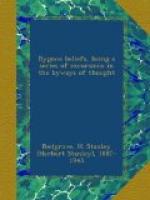[2a] Cf. PLATO: The Timaeus, SESE xxviii—xxx.
[1] In reference to this matter FRANKLAND remarks: “In those early days the innermost secrets of nature lay in the lap of geometry, and the extraordinary inference follows that Euclid’s Elements, which are devoted to the investigation of the regular solids, are therefore in reality and at bottom an attempt to `solve the universe.’ Euclid, in fact, made this goal of the Pythagoreans the aim of his Elements.”—Op. cit., p. 35.
[2b] Op. cit., SE xxix.
Music played an important part in the curriculum of the Pythagorean Brotherhood, and the important discovery that the relations between the notes of musical scales can be expressed by means of numbers is a Pythagorean one. It must have seemed to its discoverer—as, in a sense, it indeed is—a striking confirmation of the numerical theory of the Cosmos. The Pythagoreans held that the positions of the heavenly bodies were governed by similar numerical relations, and that in consequence their motion was productive of celestial music. This concept of “the harmony of the spheres” is among the most celebrated of the Pythagorean doctrines, and has found ready acceptance in many mystically-speculative minds. “Look how the floor of heaven,” says Lorenzo in SHAKESPEARE’S The Merchant of Venice—
" . . . Look how the floor of heaven Is thick inlaid with patines of bright gold: There’s not the smallest orb which thou behold’s” But in his motion like an angel sings, Still quiring to the young-eyed cherubins; Such harmony is in immortal souls; But whilst this muddy vesture of decay Doth grossly close it in, we cannot hear it."[1]
[1] Act v. scene i.
Or, as KINGSLEY writes in one of his letters, “When I walk the fields I am oppressed every now and then with an innate feeling that everything I see has a meaning, if I could but understand it. And this feeling of being surrounded with truths which I cannot grasp, amounts to an indescribable awe sometimes! Everything seems to be full of God’s reflex, if we could but see it. Oh! how I have prayed to have the mystery unfolded, at least hereafter. To see, if but for a moment, the whole harmony of the great system! To hear once the music which the whole universe makes as it performs His bidding!"[1] In this connection may be mentioned the very significant fact that the Pythagoreans did not consider the earth, in accordance with current opinion, to be a stationary body, but believed that it and the other planets revolved about a central point, or fire, as they called it.
[1] CHARLES KINGSLEY: His Letters and Memories of His Life, edited by his wife (1883), p. 28.




